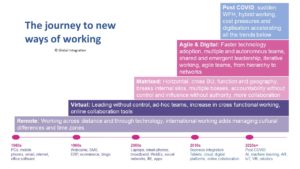The new normal – It’s not new and it’s not normal
I’m getting a bit bored with the phrase “the new normal”. I know I have used it a lot myself, but increasingly I think it is neither new nor normal!
We are researching change management for our next book and a lot of change management literature assumes that we need to manage 3 steps
- unfreezing the way we are doing things today
- making the change
- solidifying in a new stable state.
Whilst I get the first two, in an era of fast-paced change I don’t think having a stable view of our desired end state has been realistic for a long time.
Do we really know what a post COVID world will look like 18 months from now? Whilst we are in the depths of the challenges it may not be the best time to make long term decisions, (you might regret selling that office) but we do need to act to cope with our current reality.
Do you really know what your organization will look like after an extended period of digital transformation? Will you ever? What we do know is we need to get started, to experiment and learn and continually evolve as was both technology and business models develop. If we wait until things become stable we will probably go out of business.
Whilst COVID is new, the main trends in ways of working are not.
- Organizations have been working remotely since the 1980s when communications technology enabled us to work across distance and organizations become became more integrated across geography. We ran our first remote and virtual teams training programme in 1994. Sales organizations have worked this way for ever! Every year since then remote working has increased
- Digital transformation is well established, it has got a lot more press in the last decade but arguably it’s been happening for much longer with, for example with the rise of ecommerce or ERP helping to integrate supply chains since the 90s.
- Agility is all the rage in many organizations – based on the 20-year-old agile manifesto.
- As organizations become more integrated, and particularly when they need to share resources and break silos they are increasingly matrixed – which began in 70s and accelerated after the financial crash 12 years ago.

Some or all of these may be new to your organization but there is a tremendous amount of learning out there from organizations who have done it successfully already. Please don’t reinvent the wheel and replicate mistakes you don’t need to make. Also don’t assume that just because you’ve made new ways of working work in the short term and in exceptional circumstances, that you’ve cracked making it sustainable, new challenges will emerge over time .
Secondly, we talk about the new normal as something we were moving into as if we have a clear view of what it is and what we need to do. Over the last few months, we have already seen that we are in a state of constant transition. Some organizations in China are almost back to how it was in 2019. Other organizations have announced they will not return to their offices until mid-2021.
We certainly still need to absorb the learning from the world’s largest experiment in remote working and embed the positive aspects of WFH and head off the next challenges.
A number of teams we are working with are considering what they have learned from the lockdown and already starting to evolve towards hybrid ways of working; focusing on what is best delivered in the office environment and what works much better remotely. Right now, many envisage this mixed working mode to continue for at least the next 6-12 months.
They know that they cannot wait for 12 months to evolve their ways of working to the situation. They also know that they cannot make very long-term decisions based on the experience of a few months, but they do need to do something now.
We have worked with several teams recently to discuss this and agree new, temporary norms.
Depending on the work they do and the industry they work in, their experiences of lockdown have been very different. However, all of them share a desire to discuss their learning and adapt. They also realise they may be having this conversation again in 6 months’ time – and that’s OK
We believe we need to think about this as an evolutionary learning process rather than a one-time change to a “new normal“ way of working . Evolving and adapting ways of working needs to be on our agenda at an organizational level and also at a team level.
This can be uncomfortable for organizations feeling the pressure to change their policies, organization structure, IT infrastructure and real estate strategies – all things that can take a lot of time.
Remember when the COVID lockdown struck? Was our response to set up a policy steering group or do an organization redesign? No, instead we just sent people home and were generally amazed at their resilience and ability to adapt. We then scrambled to make sure they had access to collaboration and communication tools to enable working from home. We are still catching up on the rest of the stuff.
You rarely get more flexibility by adding more structure or policies. Flexibility comes from behaviour and our people have shown us that they have far more flexibility and adaptability then we may have thought.
As you come back from your summer breaks it is time to discuss with your teams what you have learned and how you need to evolve during this hybrid period. Here is a link to a previous blog of ours with some ideas of what a team reboot meeting like that should cover – including a sample virtual meeting design. You may need to do this again as circumstances change.
If you need help with this, we have ready to run virtual team workshops you can use or adapt.
Or, if you have a perfect view of the future you could get started completely changing your physical infrastructure, and hope you are right.

Explore our training programs to see how we can help.
Agile & Digital Training Matrix Management Training People and purpose Training Virtual Teams TrainingEducate yourself further with a few more or our online insights:
30 years of experience learning with a range of world class clients
We work with a wide range of clients from global multinationals to recent start-ups. Our audiences span all levels, from CEOs to operational teams around the world. Our tools and programs have been developed for diverse and demanding audiences.

Tailored training or off the shelf modules for your people development needs
We are deep content experts in remote, virtual and hybrid working, matrix management and agile & digital leadership. We are highly flexible in how we deliver our content and ideas. We can tailor content closely to your specific needs or deliver off the shelf bite sized modules based on our existing IP and 30 years of training experience.
For more about how we deliver our keynotes, workshops, live web seminars and online learning.